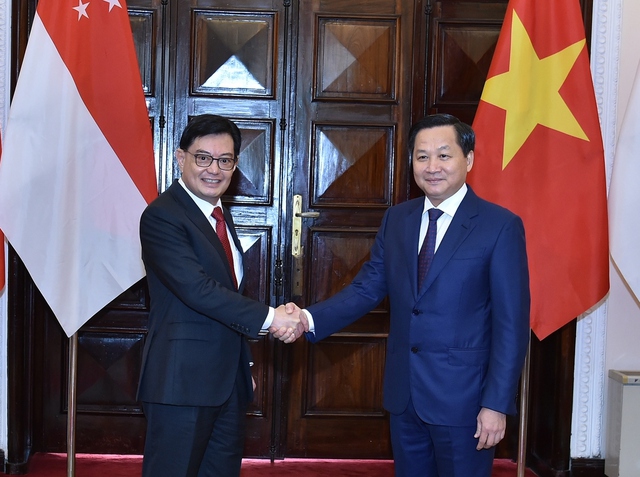Singapore wishes to further strengthen strategic partnership with Viet Nam
VGP - Singapore wishes to further develop its strategic partnership with Viet Nam, a Singaporean official says.

Deputy Prime Minister Le Minh Khai (right ) and Singaporean Deputy Prime Minister and Coordinating Minister for Economic Policies of Singapore Heng Swee Keat at the Government Guest House in Ha Noi, September 12, 2022. Photo: VGP
Viet Nam is an important economic partner of Singapore in the region and Singapore wishes to further develop its strategic partnership with Viet Nam, said Deputy Prime Minister and Coordinating Minister for Economic Policies of Singapore Heng Swee Keat.
Heng made the statement during his talks withVietnamese Deputy Prime Minister Le Minh Khai in Ha Noi on September 12.
Le spoke highly of the visit by the Singaporean official, which takes place ahead of the 50th anniversary of bilateral diplomatic ties and the 10th anniversary of the Viet Nam-Singapore strategic partnership next year.
The two officials shared the view that their strategic partnership has been growing in various areas. Despite COVID-19, two-way trade surged by 23.3 percent annually to US$8.3 billion in 2021.
Singapore remained the biggest ASEAN investor in Viet Nam with 2,959 valid projects worth US$69.8 billion, and the Viet Nam-Singapore industrial parks (VSIPs) have become a successful model of bilateral economic cooperation.
They agreed to launch initiatives in the fields of clean energy, sustainable development, innovation, digital transformation, digital economy, risk management in finance-banking, cyber security, and workforce training to meet the requirements of the fourth Industrial Revolution.
Le encouraged Singaporean firms to import Vietnamese products such as farm produce, fisheries and apparels; create favorable conditions to bring processed food to Singapore's distribution system, as well as invest in VSIPs, with priority given to electronics, smart production, information technology, digitalization, and new materials.
Heng agreed that the two sides should enhance cooperation to boost trade and supply chain connectivity.
Both sides also pledged to together maintain solidarity and uphold ASEAN's central role in the region.
Congratulating Singapore on becoming the first country to approve the Regional Comprehensive Economic Partnership (RCEP), Le said multilateral trade deals like the RCEP, the Comprehensive and Progressive Agreement for Trans-Pacific Partnership and sub-regional agreements, are important tools to deliver on commitments related to free trade, fair competition and transparent economic policies.
On regional and global issues, Le stressed that building the East Sea into a region of peace and cooperation in line with international law and the 1982 United Nations Convention on the Law of the Sea is of utmost necessity, thus laying the foundation to ensure an environment conducive to economic development./.
